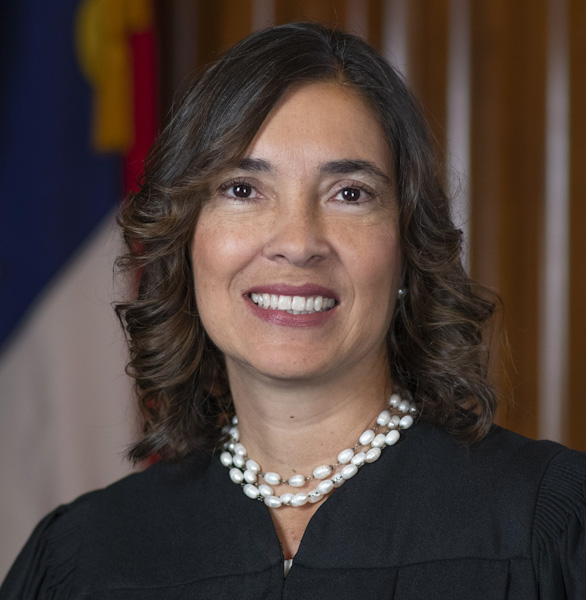Onetime SCOTUS contender sues judicial conduct commission, alleging bid to stifle criticism

North Carolina Supreme Court Justice Anita S. Earls has said in a lawsuit she was subjected to “a series of monthslong intrusive investigations” by the North Carolina Judicial Standards Commission after she criticized her judicial colleagues. Photo from the North Carolina Judicial Branch website.
A North Carolina justice who was once a U.S. Supreme Court contender is alleging that ethics regulators in her state are chilling her First Amendment right to free speech.
In an Aug. 29 lawsuit, North Carolina Supreme Court Justice Anita S. Earls said she was subjected to “a series of monthslong intrusive investigations” by the North Carolina Judicial Standards Commission after she criticized her judicial colleagues.
Reuters, Law360, WRAL and the News & Observer are among the publications with coverage of Earls’ federal suit.
Earls said she was being investigated partly for a June interview with Law360 in which she commented on diversity and implicit bias in the court system. Earls is the only Black woman on the state supreme court.
Past reports had indicated that Earls was among several Black women who were under consideration for a Supreme Court nomination before now-Justice Ketanji Brown Jackson was chosen. Earls was elected to the North Carolina Supreme Court in 2018 and began serving in January 2019.
In a statement, the judicial commission’s executive direct, Brittany Pinkham, said the commission “is statutorily obligated to investigate all instances of alleged judicial misconduct and cannot comment on pending investigations.”
In the Law360 Q&A, Earls had criticized elimination of an equity committee and implicit bias training, which happened after the state supreme court flipped from a Democratic to a Republican majority.
Earls had said the new members of the state supreme court have an allegiance “to their ideology, not to the institution.”
She also noted a lack of diversity among law clerks on the North Carolina Supreme Court. And she told the publication that her colleagues seem to be unfairly interrupting female lawyers during arguments and to be interrupting her more than male justices. She added that the interruptions weren’t taking place in every case, and the politics of the case being argued could have been a factor.
Earls said she wasn’t suggesting that the problems were due to intentional racial animus, but “our court system, like any other court system, is made up of human beings, and I believe the research that shows that we all have implicit biases.”
The judicial commission had also notified Earls in March that it was investigating her for comments made at two public events and to the media regarding “matters being currently deliberated in conference” by the North Carolina Supreme Court.
Earls said the comments related to three administrative matters:
- Rescission of a universal citation system
- A decision to allow unpublished opinions without precedential value
- A proposal to eliminate an automatic right of appeal to the state supreme court when there is a court of appeals dissent
The public events were forums hosted by the North Carolina General Assembly Courts Commission and the North Carolina Bar Association’s board of governors. Earls was a member of both bodies, serving as vice president of the second.
The complaint that led to the March investigation was dismissed—at the time—without further action. The commission told Earls’ lawyer, however, that she should be reminded of judges’ duty to conduct themselves in a way that promotes public confidence in the judiciary.
The earlier complaint has been reopened in light of the new incident, Earls was informed.
According to the suit, the judicial commission’s actions have not only chilled Earls’ free speech rights but have also interrupted her ability to do her work as a justice. In addition, the actions “have understandably taken a substantial emotional toll, as she has tried to negotiate the commission’s capricious line on what judges can and cannot say about important public issues affecting the justice system.”
Earls’ suit seeks a declaratory judgment that the commission’s attempts to investigate her for comments on matters of public concern are unconstitutional, and that her First Amendment rights were violated under Section 1983 of the federal civil rights statute.
Write a letter to the editor, share a story tip or update, or report an error.


